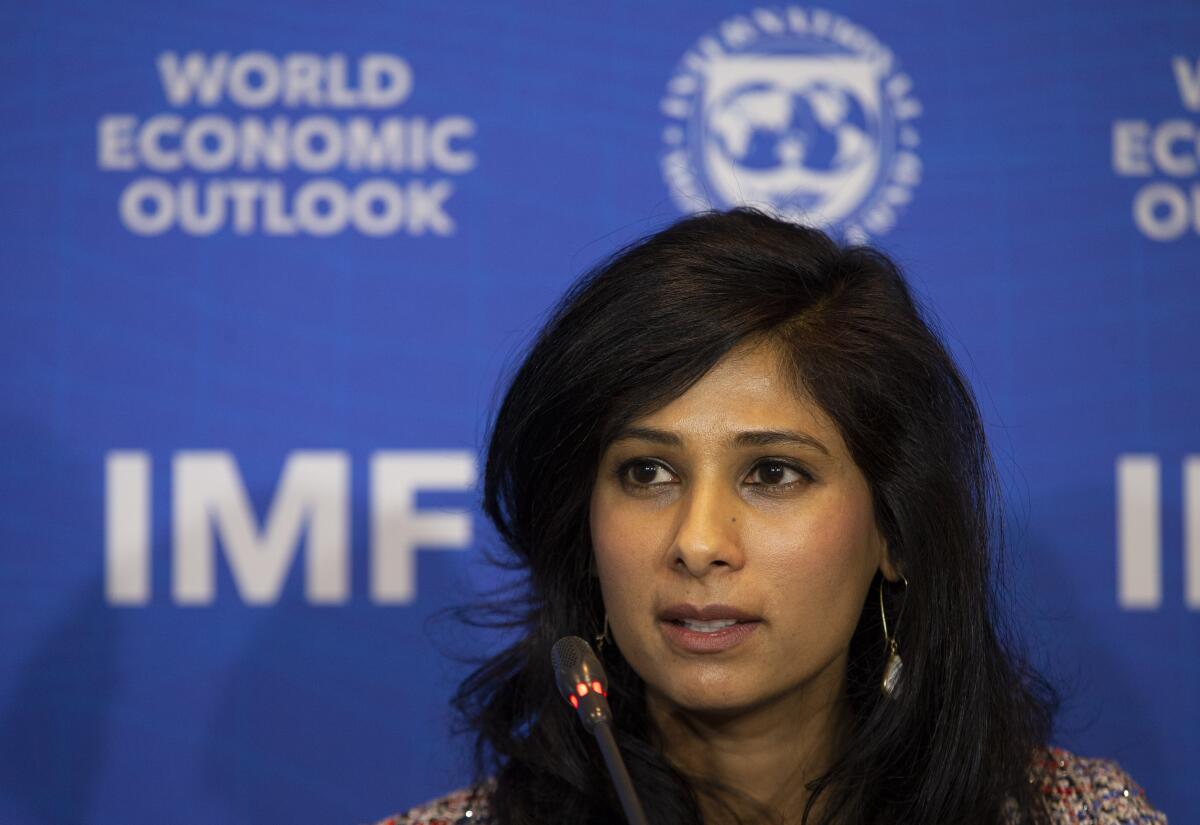IMF sees coronavirus-fueled recession as worst since Great Depression

- Share via
The International Monetary Fund predicted Tuesday that the “Great Lockdown” recession, fueled by the coronavirus pandemic, will be the steepest in almost a century and warned that the world economy’s contraction and recovery would be worse than anticipated if the coronavirus lingers or returns.
In its first World Economic Outlook report since the spread of the coronavirus and subsequent freezing of major economies, the IMF estimated that global gross domestic product will shrink 3% this year.
That compares to a January projection of 3.3% expansion and would likely mark the deepest dive since the Great Depression. It would also dwarf the 0.1% contraction of 2009 amid that financial crisis.
While the fund anticipated growth of 5.8% next year, which would be the strongest in records dating back to 1980, it cautioned risks are tilted to the downside. Much depends on the longevity of the pandemic, its effect on activity and related stresses in financial and commodity markets, it said.
Even if the IMF’s forecast proves accurate, it said output in both advanced and emerging markets would undershoot their pre-coronavirus trends through 2021, seemingly dashing any lingering hopes of a V-shaped economic rebound from the health emergency. The cumulative loss in global GDP this year and next could be about $9 trillion — bigger than the economies of Japan and Germany combined, IMF chief economist Gita Gopinath said.
“This is a crisis like no other, which means there is substantial uncertainty on the impact it will have on people’s lives and livelihoods,” Gopinath said in an online briefing.
In its forecasts, the IMF assumes that countries experiencing severe epidemics will lose about 8% of working days this year during containment efforts and the loosening of restrictions.
In a further sign of pessimism, the IMF sketched out three alternative scenarios in which the virus lasted longer than expected, returned in 2021 or both. A lengthier pandemic would wipe 3% off GDP this year compared with the baseline, while protraction plus a resumption next year would mean 8% less output in 2021 than projected, it said.
The IMF’s baseline scenario assumes that the pandemic fades in the second half of this year and that containment measures can be gradually wound down.
How the coronavirus outbreak might affect you or your family depends heavily on where you work and live and the generosity of your employer’s benefits.
As with the virus’ reach, the economic hit is sweeping. In the United States, GDP is expected to shrink 5.9%, compared with the 2% expansion predicted in its last global outlook in January. It may grow 4.7% next year, the IMF said. The euro area will probably shrink 7.5% in 2020 and expand 4.7% in 2021, it said.
“Many countries face a multi-layered crisis comprising a health shock, domestic economic disruptions, plummeting external demand, capital-flow reversals and a collapse in commodity prices,” the IMF said. “Risks of a worse outcome predominate.”
The grim projections are a stark reversal from the IMF’s outlook less than two months ago. On Feb. 19, the fund told Group of 20 finance chiefs that “global growth appears to be bottoming out.” Three days later, Managing Director Kristalina Georgieva predicted the virus would likely cut just 0.1 percentage point from the fund’s global growth forecast for this year, although she acknowledged “more dire scenarios” were being studied.
The fund sees advanced economies shrinking the most: 6.1%. Emerging-market and developing economies are expected to see a 1% drop. Growth in China and India will decelerate but their economies will still manage to expand 1.2% and 1.9%, respectively, the fund said.
Global trade volume in goods and services will probably tumble 11% this year, the fund said.
Growth in consumer prices in advanced economies may average 0.5% this year, accelerating to 1.5% in 2021, it said. The jobless rate in the U.S., which was at a half-century low before the pandemic, may swell to 10.4% this year, the IMF said.
A hotel housekeeper, victim of a coronavirus layoff, struggles to support her three kids. ‘I just want to keep my little family together,’ she says.
Most central banks around the world have cut interest rates to around or below zero to blunt the effect of the coronavirus pandemic, with the Federal Reserve launching an unprecedented variety of emergency programs to support as much as $2.3 trillion in loans. Fiscal stimulus packages have varied more. The U.S. is providing about 10% of GDP in support and Germany about 4.5%, while Japan’s program is worth about 20% of GDP, according to Bloomberg Economics.
The IMF said that fiscal measures will need to increase if stoppages to economic activity persist or if the pickup in activity once restrictions are lifted is too weak. Economies with financing constraints may also require external support, the fund said. Georgieva had repeatedly pledged to use the IMF’s $1 trillion in loan capacity to help its members.
The IMF and World Bank are holding their spring meetings via video conference for the first time ever this week. Their normal in-person meetings typically draw thousands of delegates, observers and journalists from 189 member countries. The program has been pared down to mostly media briefings and private meetings, skipping the typical seminars and public discussions.
More to Read
Inside the business of entertainment
The Wide Shot brings you news, analysis and insights on everything from streaming wars to production — and what it all means for the future.
You may occasionally receive promotional content from the Los Angeles Times.












